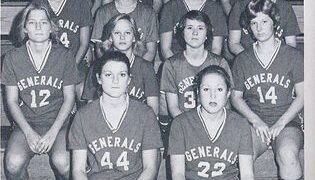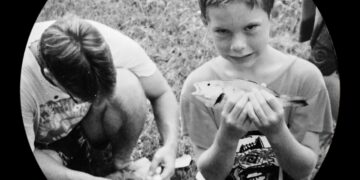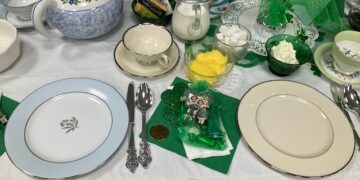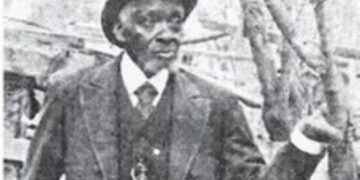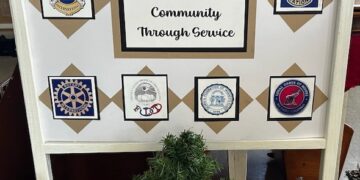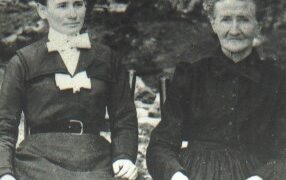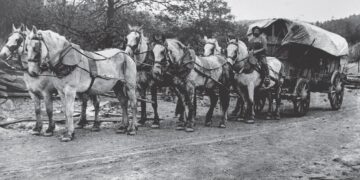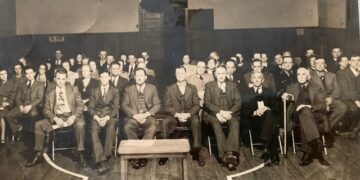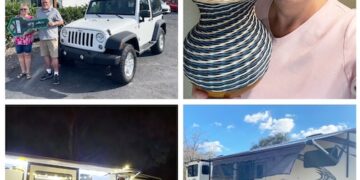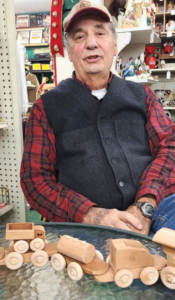
When you first meet Hobert Harvey, what you see is what you get. A big, friendly, humble guy who likes to work with his hands.
Hobert makes amazing toys – mostly trucks, back hoes, articulated front end loaders, and trains. Really, most any vehicle, particularly those used in construction.
He also makes walking sticks and makes great use of an invasive species, bamboo – turning it into something useful- helping people get around or to use when hiking. There comes a time in everyone’s life, whether we want to admit it or not, when we are all going to need a good, sturdy walking stick or cane.
The best part is, the proceeds from whatever he sells, are donated to his church’s building fund, Bethel Church of the Brethren in Mayland. If there is an auction in the area, Hobert’s creations are a hot commodity, and the bidding war starts. Some of his trains can bring in anywhere from low to mid 3 figures at auction! Groups like Mennonite Relief, World Hunger auction, and WRE, benefit from sales of his woodwork. He says,” I donate everything anyway, I don’t keep anything.”
Originally from the Eastern Seaboard, near St. Michaels, Hobert Harvey has lived here most of his life. His family always worked in wood. His brother is a subcontractor, who works on old homes, and also makes toys on the side with his scraps. As a young man, Hobert attended Bridgewater College. At that time, he wasn’t familiar with poultry plants back on the eastern shore, and there didn’t seem to be a lot of jobs there for him. He took a job here, as a trainee and worked his way up over the years. He’s been here ever since.
If you have scrap wood, Hobert is the man to find a use for it. He rarely uses new wood, loves to use reclaimed wood for his projects. He doesn’t limit his talents to toys and canes, he’s made a table or two, and other things over the years. People give him wood scraps, left over from their own projects, that wood may be newer, but he rarely buys. The only things he may purchase are the nuts, bolts, and sometimes the wheels (for toys like his trains). Train wheels need to be uniform and easy to roll, so buying those makes more sense. Scraps are what most of his vehicles are made of- cherry, oak, walnut- whatever he has. A couple of power tools, and a lot of hand tools, and some patterns are used to create his toys. One good source for the wood scraps is Mercy House Contractor Store- the cut offs. Hobert is an admitted scavenger! All for a good cause. Some of the bigger toys take up what is equal to 4 board feet – when bought as new lumber, is pretty pricey in today’s market.
Favorite pieces of wood to work with, although there are many favorites, are the pieces from old apple crates. Their rich color from years of holding apples in the orchard, lends itself beautifully to his projects, especially when coated with mineral oil. The toys are heavy, made from oak, cherry, and more. You can tell one of his toys, by the style, and his are usually signed on the bottom.
The woodworker said, “I’m sort of semi retired, so I need something to do!”
Prior to retirement, he managed area poultry plants for 35 years. Then he went to Bowman Fruit Sales and managed their plants for a while. “Then, there came a day, when I said, I need to retire!” He retired in 2018, but still works parttime for Bowman orchards and packing house in Timberville. His wife, Barbara, is also retired. She was a reading teacher at Plains Elementary in Timberville.
Working for Bowman allows him to source those aged and broken wood crate scraps that give character to his toys.
Walking sticks were a new creation this year. The Harveys’ neighbor has bamboo and it’s such an invasive species – “You never want to plant bamboo!”
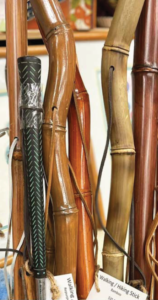
There is a therapy counselor who happened to come in J&B, saw Hobert’s bamboo, and bought some to make flutes. He uses music therapy with his patients, and, played some for the ladies at J&B while he was here. So, another use for the overflow of bamboo was found! Hobert has made whistles before, so, who knows, one day he may try to make a flute!
It takes a lot to dry bamboo, and it is a learning process he is still working on. Some of the bamboo, has curves, which makes a nice cane. He stains it with 3 coats of stain, and 3 coats of finish. 6 coats with a day of drying in between each coat. First, though, the bamboo has to be dried. That takes 2-3 months. There is a quicker way, but that is more work. You have to drill holes, and use a propane torch to burn the moisture out. Hobert just puts his out in the sun, with branches on, and turns them every couple of weeks, and they dry in a leisurely, natural way. In the winter, he put some in one of his outbuildings, and they dried, but they still had the green color. And, “green is hard to hide!” Sun fades the green away. Although the bamboo itself is hollow, there is a cap between each joint. Those caps make a great natural top for the canes.
Each of the canes come with a leather strap, and a wood tag, a chip carved cross etched on it. There are also a few walking sticks made out of golf club sticks – creative repurposing. A great gift for the golfer in your family!
Some of Hobert Harvey’s creations can be found at J&B Country Store in Broadway. Everyone needs a good stick at some time or another! Hobert is constantly restocking! Christmas is coming, and his toy trucks and trains would make wonderful stocking stuffers for some lucky children! Plus, all proceeds go to good causes- it’s the season for giving! It’s a win-win!



